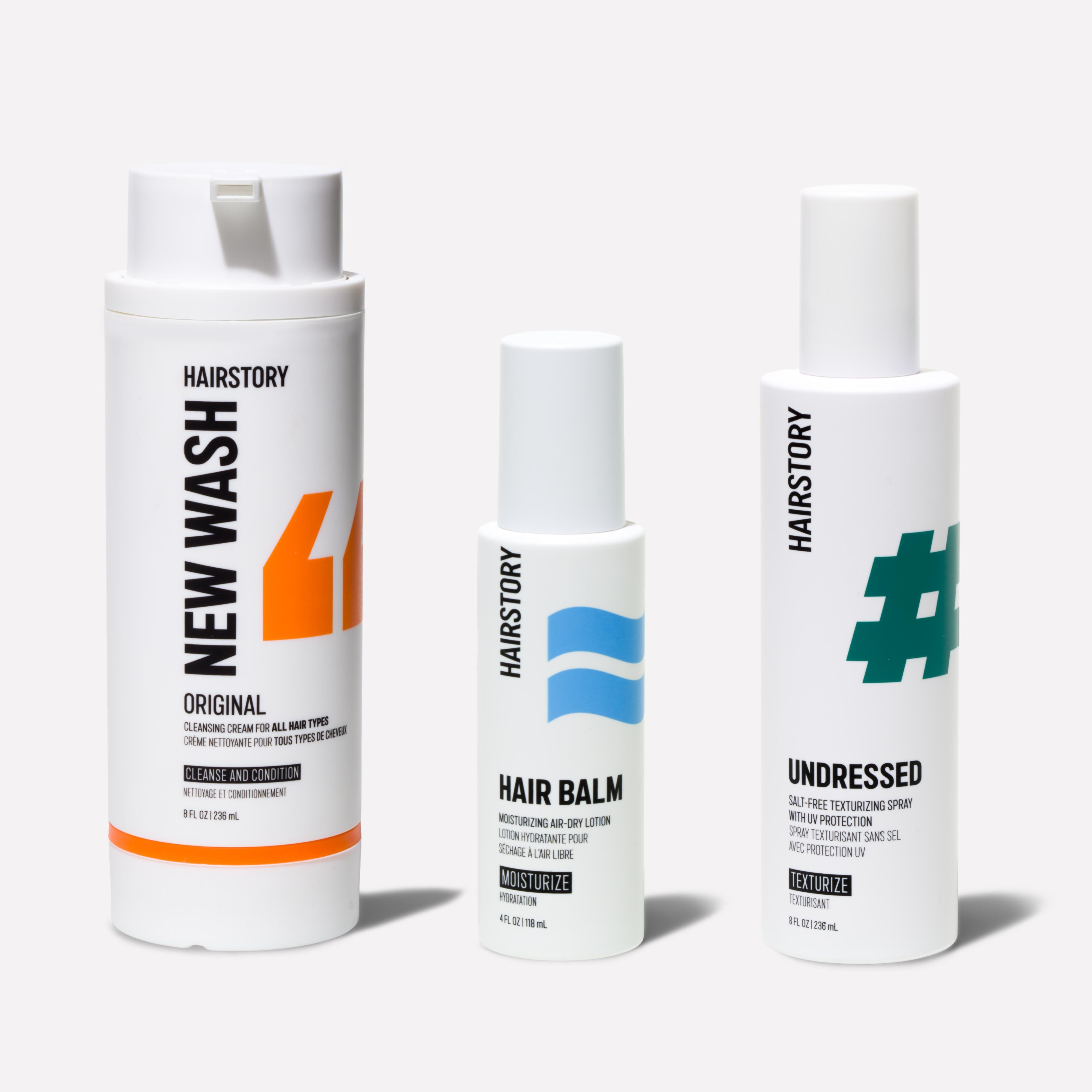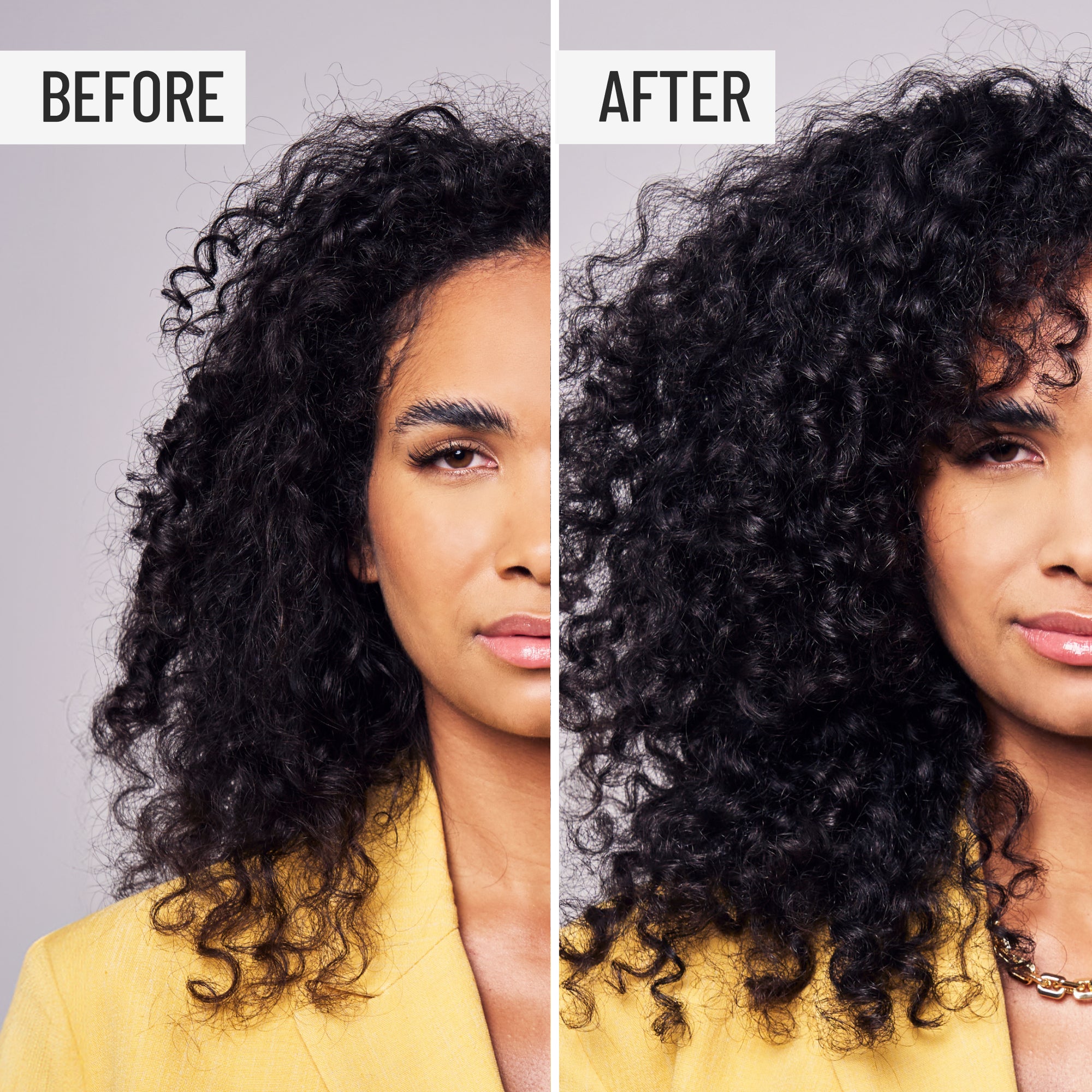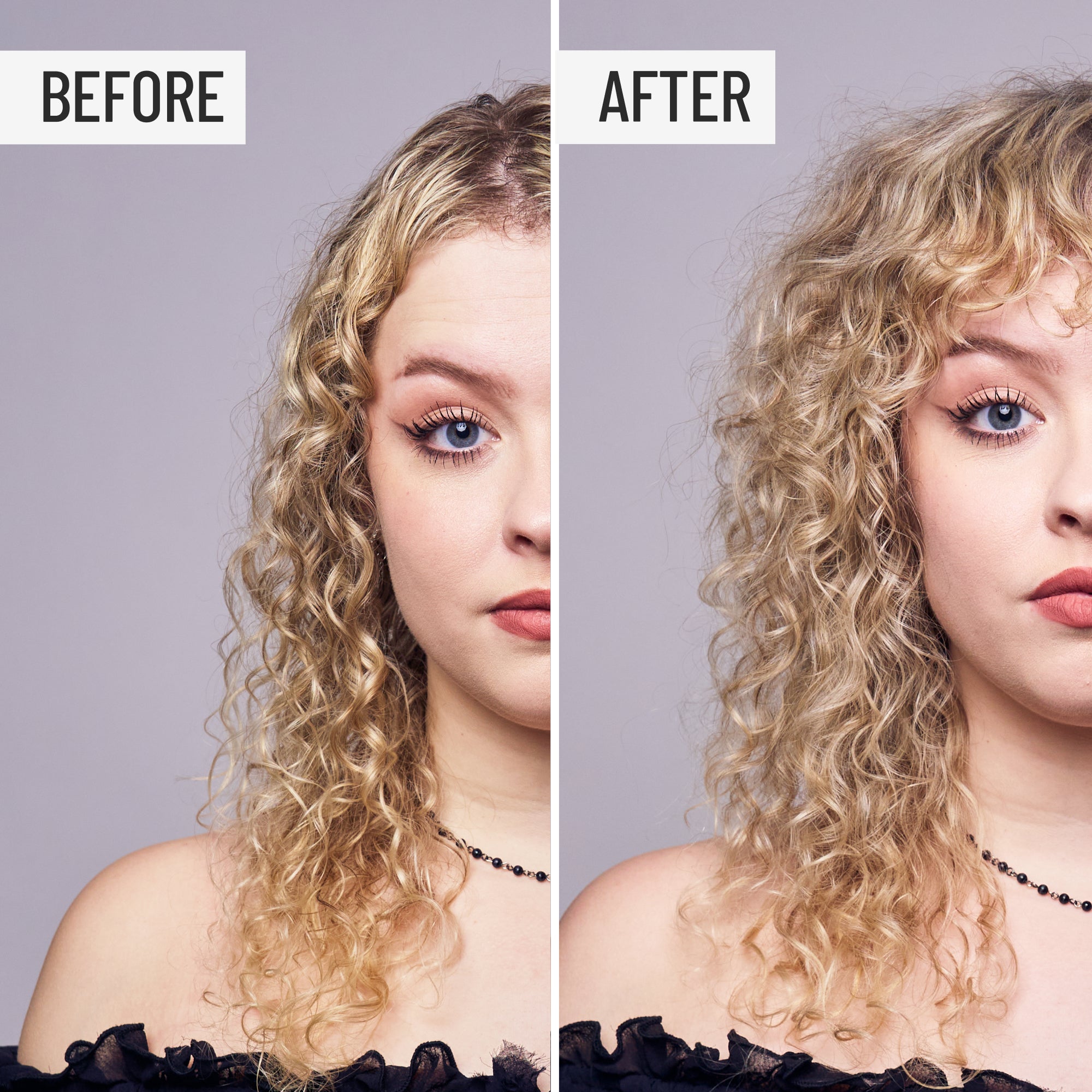No matter your hair type, color or texture, everyone deals with frizzy hair.
And when the weather comes into play—no one likes what our friend humidity does to hair. We’ve all had our share of bad hair days because of frizz, but luckily that doesn’t have to be the case anymore. Let’s learn how to get rid of frizz by diving into the causes and methods for combating this unwanted look.
THE BIG QUESTION: WHY IS MY HAIR SO FRIZZY?
Let’s begin with some frizz education. What actually is frizz?
Celebrity hairstylist Arsen Gurgov told Huffington Post “Frizz is caused when hair is dry and lacks moisture. When your hair is dry, the cuticle is rough, and when the weather is humid, it’s the perfect recipe for frizz. The outer layer of the hair takes in moisture from the air, causing the hair to swell and frizz.” The hair cuticle is made up of layers that lay flat, but open up if exposed to moisture or are damaged. This is why frizzy hair tends to stand apart or curl, and ultimately adopts a different type of texture than the rest of your hair.
Frizz is basically the extra dry strands of hair that are desperately calling out for moisture.
Now let’s take a look at what causes frizzy hair.
1. Humidity
Bad hair days happen, but why does rainy, humid weather make them even worse? Frizz is caused by dry hair seeking moisture, so when the weather is particularly humid, that’s when those strands soak up moisture like a sponge. Summer humidity and warm rainy days can be a tough battle to keep frizz at bay. According to Smithsonian Magazine, “hair’s chemical structure makes it unusually susceptible to changes in the amount of hydrogen present in the air, which is directly linked to humidity.” In other words, hair doubles back in on itself when it absorbs water, then it forms bonds and swells until it disrupts the cuticle causing frizz. (howstuffworks)
2. Damage
Damaged hair knows a variety of causes, including low-quality hair product ingredients, color and chemical treatments, heat tools used for styling, and more. And we can’t forget about the lesser-known causes of hair damage, including washing hair with scalding water, not using a microfiber towel, and simply touching your hair too much. It seems like a lot can damage your hair, but we’re here to break down the steps you can take to combat damage (more on this later!).
When it comes to sulfates in shampoo, just say no. As we’ve talked about before, washing your hair with sulfates can strip your hair of its natural oils causing hair to dry out which leads to frizz. Try to keep washing to a few times a week with a sulfate-free hair cleanser. And as always try to use sulfate-free hair products (both for cleansing and styling) to give your hair the best chance at remaining healthy.
Another ingredient to watch out for is alcohol. Not to add any more confusion but there are two types of alcohols: fatty alcohols (good) and short-chain alcohols (bad).
Fatty alcohols are great for keeping hair hydrated and soft. Short-chain alcohols evaporate quickly and leave the hair stripped of moisture and are typically found in styling products like hairspray and gel. Watch out for the following ingredients: Alcohol denat, Ethanol, SD alcohol 40, Propanol, Isopropyl and Propyl.
Dry hair as a result of damage from chemical and color treatments, bad products, going too long in-between haircuts, and more, can be a vicious cycle. Essentially, the dryer your hair is, the more prone it is to frizziness. Of course, there are products to help combat dry hair but sometimes your hair type comes into play which is down to genetics.
3. Hair Type
As we learned earlier, the hair cuticle is made up of layers that lay flat. Factors that can make this more difficult include thicker hair and curly hair.
Thick hair is harder to reshape and realign which causes the cuticle to struggle to lay flat, leading to frizz. For curly hair, because of the pattern in which it grows, it can lead to misaligned cuticles causing the hair to frizz.
Curly hair also tends to be drier because the oil cannot move up and down the hair shaft as easily as straight hair.
Now that we have a better understanding of what causes frizz, let's take a look at some ways to prevent it. And yes, it’s totally possible to control frizz. We’re going to show you how.
HOW TO GET RID OF FRIZZ
Depending on your hair’s specific needs there are multiple different approaches to combating frizz.
1. The Cold Water Secret
Frizz control actually starts in the shower. Make sure that you keep the water temperature in mind when washing your hair. Of course, you want to take a hot shower, but scalding hot water can strip hair of its natural oils which leads to dryness. Cold water can help seal in moisture and for curly hair, it helps the follicles clump together creating more defined curls. The same logic applies to the cool setting on your blow dryer. It’s there so that you can finish your blow-dry with a shot of cool air to help lock in moisture by triggering the cuticle to seal.
2. Styling Begins In The Shower
To keep frizz at bay consider styling in the shower. For curly hair, it’s important to style your hair when it’s completely wet because this allows the product to evenly disperse and saturate the hair. If hair is partially dry you may be left with frizzy, inconsistent curls. Work a leave-in conditioner or styling oil through the hair with fingers or a wide-tooth comb. Leave-in conditioners like Hair Balm are great for preserving the integrity of your curls and keeping hair moisturized. For straight and fine hair, getting tangles under control is a huge part of defrizzing your hair. Try detangling in the shower while hair is wet with a brush or wide-tooth comb.
3. Heat Protection Is A Must
Sometimes you can’t get out of heat styling, that’s why it’s super important to make sure you always use a heat protectant product. No matter your hair type, incorporating a form of heat protection to your hair care routine can help prevent damage like split ends, breakage, and smooth those frizzy flyaways that usually result from a lack of moisture from constant heat styling.
Depending on the severity of your frizz you may want to invest in high-quality blow dryers and heat styling tools. These products typically last longer and often incorporate new technology and materials to help curb the damage from the heat.
For curly hair, blow dryers can be a bit of a love-hate relationship. Diffuser attachments are a great way to delicately dry sections of hair. According to Good Housekeeping “Normal hair dryers toss hair around, causing friction and frizz, a diffuser helps you dry your hair without all that movement so your curls can bounce, not fray.”
4. What’s Touching Your Hair?
Think about what your hair comes in contact with on a daily basis that can cause friction and ultimately frizz. Let's start with your towel. Traditional towels can be rough on hair and it can also disrupt the cuticle. Consider trying a microfiber towel to dry your hair with. Its unique fiber structure allows it to absorb more water, helping your hair to dry faster. It also eliminates the need to rub or wring out your hair which can cause frizz and damage.
Another hair care accessory to consider adopting is a silk pillowcase. We know that sounds luxurious and princess-like, but there is a scientific reason why you should sleep on a silk pillowcase. The slick texture of silk creates less friction on skin and hair which helps to prevent irritation and damage. Yes, the silk also benefits your skin so consider this a must-have beauty investment. Silk is also naturally hypo-allergenic which makes this a great option for allergy sufferers.
And lastly, you are touching your hair. Yes, you. Blogger Ashly Rodriguez told Glamour, “My number-one tip for preventing frizz: Keep your hands out of your curls. Constantly touching your hair will bring all the frizz you try to avoid.” Touching your hair can create frizz if your hands are warm or moist. So it’s best to keep your hands away from your hair if possible!
5. Use the Right Products Strategically
Using the right products can make or break your good hair day! Hair oils are a great way to protect your hair from frizz by adding shine, smoothness, hydration, and protection. Hair oils might sound scary or intimidating but most of them are lightweight and when used correctly, will benefit the hair immensely. They can be used as a styling treatment or as a deep-conditioning hair mask for extra dry or damaged hair. Apply the oil to wet or damp hair to hydrate and protect it from frizz. Be sure to look for hair oils that are silicone-free. Silicones can create a barrier around the hair cuticle preventing moisture from penetrating the hair shaft which can ultimately cause frizz. Some of the best natural oils for hair include rosehip oil, grapeseed oil, castor oil, coconut oil, and more. Depending on your texture and how dehydrated your hair is, you can opt for heavier oils or deep-conditioning treatments to help eliminate frizz.
Frizz affects almost everyone. No matter your hair type or texture. While the weather, damage, and our hair type help determine how frizz our hair can become, frizzy hair is not a lost cause. Your hair can be salvaged! We’ve established a few different ways to treat hair in order to prevent frizz. With a few small changes, you can work on taming frizz and getting back to the good hair days you deserve.
Sources:
Brucculieri, Julia. “What Actually Causes Frizzy Hair?.” Huffington Post, 26 June 2018. URL.
Stromberg, Joseph. “Why Humidity Makes Your Hair Curl.” Smithsonian Magazine. 12 April 2013. URL.
Dove, Laurie L. “Why does humidity make my hair frizz?.” How Stuff Works. URL.
Whittington, Abigail. “10 Ways to Tame and Get Rid of Frizzy Hair for Good.” Good Housekeeping, 27 June 2019, URL.
Cacciatore, Bella. “How to Get Rid of Frizzy Hair: 15 Tips That Actually Work.” Glamour, 2 October 2020. URL.































